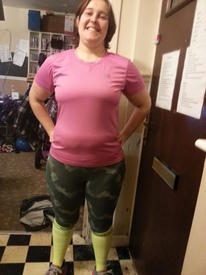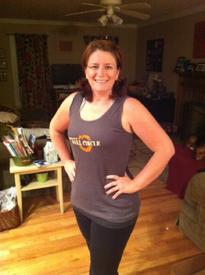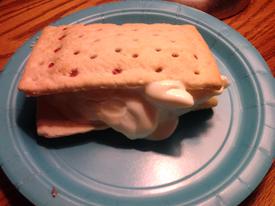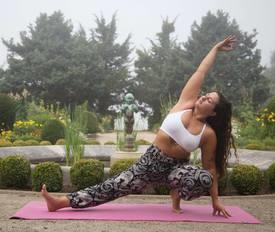Struggling to run

EstherZue
Posts: 39 Member
Hi all,
I am really struggling to do one of the most basic exercises – running. I was planning to run on 3 days a week for 45 min in the park outside. After 10 min I am close to collapse and have to stop because by knees get wobbly. My breathing is fine though – not out of control. I just literally feel too weak to continue.
It’s not because I’m unfit. I’ve been doing a bootcamp since March, 3 times a week, 30 min cardio and 30 strength, and I’ve improved my overall fitness tremendously.
So how come I can last through 1 hour really tough military exercises but if I have to run for more than 10 min I feel I’m collapsing. Any ideas on how I can last 45 min, i.e. improve my stamina?
I am really struggling to do one of the most basic exercises – running. I was planning to run on 3 days a week for 45 min in the park outside. After 10 min I am close to collapse and have to stop because by knees get wobbly. My breathing is fine though – not out of control. I just literally feel too weak to continue.
It’s not because I’m unfit. I’ve been doing a bootcamp since March, 3 times a week, 30 min cardio and 30 strength, and I’ve improved my overall fitness tremendously.
So how come I can last through 1 hour really tough military exercises but if I have to run for more than 10 min I feel I’m collapsing. Any ideas on how I can last 45 min, i.e. improve my stamina?
0
Replies
-
It sounds to me as though you are going out too fast.
Try slowing down (even if you think you are already going slow - go slower!) and you will almost certainly be able to go further.
Once you have built up your endurance you can work on speed.
Starting out slowly lets your joints and muscles get used to the different activity without so much risk of injury.
You might also like to look at one of the interval run training programs like C25K, or the ones available through Runner's World or RunKeeper.0 -
You might also like to look at one of the interval run training programs like C25K, or the ones available through Runner's World or RunKeeper.
I was going to suggest the same thing. I've just started the C25K and its a great intro into running. you can get apps online that make it very easy both for android and apple - mine cost me £0.69 but here are also some very good free ones.0 -
At a guess I'd say you're possibly running too fast. It probably doesn't seem it but if you are pushing yourself to the max you will be exhausted in 10 minutes!!!! Slow down, work on your endurance and build speed later. This is a different kind of exercise to what you have been working on so uses different muscle groups, different breathing techniques etc!
Also maybe consider getting a couch to 5k programme to follow - you'll probably breeze the first week of it, but there's nothing wrong with starting slowly and building it up. If you go out at full pelt intending to run 45 mins you could well end up injured!! C25K is a great interval programme to build your stamina - when you can comfortably complete the 5k at a run all you have to do is work on improving your pace!0 -
Thanks for your quick responses guys.
I checked the C25K program, it looks awesome. But seeing how slowly it starts I guess its no wonder I'm maxed out after 10 minutes. In the bootcamp we run 5 min through deep sand or sprint. So I guess my endurance level is really lame :laugh:
I really dont think I can slow down any more. Yesterday in the park a nordic walker overtook me :grumble:0 -
Thanks for your quick responses guys.
I checked the C25K program, it looks awesome. But seeing how slowly it starts I guess its no wonder I'm maxed out after 10 minutes. In the bootcamp we run 5 min through deep sand or sprint. So I guess my endurance level is really lame :laugh:
I really dont think I can slow down any more. Yesterday in the park a nordic walker overtook me :grumble:
You might be surprised at how slow you can go if you put your mind to it
Try C25K and see how it works for you - I'm betting that a little bit of structure to build up your endurance will work wonders.0 -
I did c25k in January and i run really slow, fast runners do 5k in around 20min my best time so far is around 45min but I have built up my endurance Sunday i ran 14.03KM in 2 hrs as a training run for a 10k race I'm doing this Sunday I'm still carrying a lot of weight but I'm hoping as i loose my speed will increase :bigsmile:
As previous posters have said slow down and if you find week 1 of C25K to easy maybe skip a week and remember to have recovery days between runs good luck :drinker:0 -
don't worry i struggle with running too
why don't you try fast walking for a few weeks to build up strength in your legs then gradually start running:) x0 -
Pace is key. Download a 180bpm metronome and strike your feet to that mid to fore foot. If you're tired then shorten your stride, if you're finding it easy then lengthen your stride. Better yet, buy a HRM and adjust your stride length to that. Don't overstride though, keep your landing foot under you.
Breathe into your belly, not your chest, your shouders and arms are a lot of weight to move
Don't bob your head around, it's a heavy old thing
Keep your arms low, soft and parallel with elbows at your sides, not swinging around wildly across your chest with clenched fists
Keep your body upright, don't lean forward too much
Brace your core muscles when you step up the pace, this area is responsible for transmitting strength to your legs
Keep your shoulders drawn back and don’t hunch over
Make sure your knees and feet are moving in line so that most movement is forward rather than up and down or side to side
Above all remember to breathe, cardio work is all about getting oxygen into your body
Running may appear basic at first but it is a sport of attrition and requires excellent form,
Best of luck0 -
I LOVE military dream's response! Many very good tips to think about... which I needed!
I just started running a couple weeks ago. I was going to start with the couch to 5K and downloaded some apps, but ended up taking a little different approach instead. Taking that concept, essentially run/walk... I have an hour long playlist of my favorite work-out songs and basically walk a song then run a song. Sometimes I get to run 2:30 and sometimes closer to 5 min, but the walk in between varies too and gives me just enough recovery to run again and the songs are invigorating. I notice a large improvement in just a few weeks building up endurance in my breathing. I'll eventually move to run 2 walk 1, but for now I run 1 walk 1 and I feel great when I'm done.0 -
Pace is key. Download a 180bpm metronome and strike your feet to that mid to fore foot.
I can run at a sub 6 minute pace or a 10+ minute pace at 180 bpm. Turnover (BPM) =/= pace.0 -
Pace is key. Download a 180bpm metronome and strike your feet to that mid to fore foot.
I can run at a sub 6 minute pace or a 10+ minute pace at 180 bpm. Turnover (BPM) =/= pace.
You've taken a single sentence out of a paragraph, read the rest of it for context. Pace is a factor of both turnover and stride length, I believe I made that fairly clear.0 -
Pace is key. Download a 180bpm metronome and strike your feet to that mid to fore foot.
I can run at a sub 6 minute pace or a 10+ minute pace at 180 bpm. Turnover (BPM) =/= pace.
You've taken a single sentence out of a paragraph, read the rest of it for context. Pace is a factor of both turnover and stride length, I believe I made that fairly clear.
I read the entire post and I still don't believe you were clear nor completely correct. Not to mention, your cause/effect relationship is flawed.
Pace is not a byproduct or factor of either turnover or stride length. Stride length increases or decreases base on your pace, not the other way around. Pace is determined by effort, and therefore perceived effort is the best way to manage pace. That is why one of the most common recommendations made to new runners it to run at a "conversational pace". This takes all the counting and thinking out of it. If you can talk, you are going at an easy effort. As you become a more proficient runner, you discover other paces that you can run when you need to. These, again, are measured by effort, not by stride length or steps per minute.
Honestly, I try to stay away from even discussing stride length, because I think too many newer runners want to go fast, see "increase your stride length" and start reaching like they are in Monty Python's Ministry of Silly Walks. This leads to injury, not faster running in the majority of the cases.0 -
Look up the word pedantic. Pace is determined by effort? What is effort? What are you doing to put more effort into the exercise? I'm guessing you're either increasing your strike rate or your stride length.
As for the ministry of silly walks... tell that to a sprinter.
Anyway, I'm glad someone got some use out of my comment before it got trolled :drinker:0 -
If you have an iPhone I recommend the app iSmoothRun. It's $5 or so but I've bought about 10 running apps and it's my fave. It lets you set up custom interval workouts, so you can make couch to 5k workouts, and you can also set a target pace for the intervals (it uses the accelerometer in combination with the GPS to tell your cadence and pace).
Like you I didn't think I could go any slower, but when I started using iSmoothRun and it started telling me to slow down I did just that (and since I was thinking about my pace/stride more my shin splints disappeared too, yay!).0 -
Like a lot of the others, I'm doing the C25K to get my running up to "speed". Another thing that helped me was to correct my running form! Man, I was doing ALL the wrong things and as soon as I looked ahead, shortened my stride, and slowed down, I felt MUCH better during the longer runs. Seriously, I'm only on week three, which the longest running interval is three minutes, but it's a breezy three minutes since I'm running properly. Good luck!0
-
Look up the word pedantic. Pace is determined by effort? What is effort? What are you doing to put more effort into the exercise? I'm guessing you're either increasing your strike rate or your stride length.
As for the ministry of silly walks... tell that to a sprinter.
Anyway, I'm glad someone got some use out of my comment before it got trolled :drinker:
I don't need to look it up. I've been called a lot of things before, but I don't believe I ever been accused of trolling before. I wish I had had time to be more thorough on my first post, but I just didn't. Anyway.
Yes, pace is determined by effort. How much force is applied to the ground through the muscles of the leg, foot and probably a bunch of other places too. You increase the force (effort) and the length of ground that is covered in each step increases. We are calling this stride length and yes it does increase as your pace increases. My Monty Python comment was in reference to those runners who reach intentionally with their front foot, resulting in a heel strike, not a sprinter, whose form is still essentially the same as a distance runner with the mid to forefoot striking the ground first under the body's center mass. You made this point in your post, which I completely agree with.
As for pace being impacted by cadence, studies have shown that this just isn't really the case. Most runners maintain between 160-180 steps per minute, regardless of pace. Is cadence important? Absolutely. But for proper running form, not for changing, finding or maintaining proper pace.0 -
As for pace being impacted by cadence, studies have shown that this just isn't really the case. Most runners maintain between 160-180 steps per minute, regardless of pace. Is cadence important? Absolutely. But for proper running form, not for changing, finding or maintaining proper pace.
Once again, if you read my post you'll see that I explicitly said to fix your strikes at 180 per minute... I actually said to use a metronome which couldnn't be any clearer :laugh: Once the form is correct you can increase stride length and once again... I explicitly said to keep your landing foot underneath your body and land mid to fore foot.
Saying strike frequency isn't important to finding proper pace is a silly thing to say in a thread where the OP is a begginner. Bottom line is this SPEED = STRIKE FRQUENCY X STRIDE LENGTH. You've already said you can vary the frequency from 160-180, I simply said to fix it at 180 to simplify the equation with a constant over time. Now then, tell me again why stride length isn't a factor of speed/pace? How does cause and effect come into it?... or was that just trolling? :laugh:
Just to close another couple of doors that seem to be bothering you:
Pace - The rate of speed at which a person, animal, or group walks or runs
Factor - One of two or more quantities that divides a given quantity without a remainder. For example, 2 and 3 are factors of 6; a and b are factors of ab.
For the final time, when you put more effort into a stride, you'll push yourself forward further per stride and.... increase your STRIDE LENGTH. Ta dah :yawn: You're still hung up on taking one sentance out of context so we're back to your original (and might I say flawed) argument now :laugh:0 -
Once again, if you read my post you'll see that I explicitly said to fix your strikes at 180 per minute... I actually said to use a metronome which couldnn't be any clearer...
I did read your entire post. I agree that foot strike should be at 180 per minute. My point all along is that this is not a function of PACE, but rather a function of FORM.Once the form is correct you can increase stride length and once again... I explicitly said to keep your landing foot underneath your body and land mid to fore foot.
As I stated before, and I'll state again. Telling any beginning runner to increase their stride length is a slippery slope that could lead to reaching (yes, I see you said to maintain a landing point center on the torso) stride that promotes a heel strike. Why not just say "run faster and maintain 180 steps per minute"? Let's not over think it.Saying strike frequency isn't important to finding proper pace is a silly thing to say in a thread where the OP is a begginner.
No, it isn't silly at all. Again, proper strike frequency promotes proper form, not proper pace.Bottom line is this SPEED = STRIKE FRQUENCY X STRIDE LENGTH. You've already said you can vary the frequency from 160-180, I simply said to fix it at 180 to simplify the equation with a constant over time. Now then, tell me again why stride length isn't a factor of speed/pace? How does cause and effect come into it?... or was that just trolling? :laugh:
Okay, no. Not trolling. I disagree with some of the points that you make and I'm trying to explain why. If I was trolling, I'd resort to name calling and all other manner of debauchery. But, I digress. Again, my point about stride length is that it increases as pace increase. We agree on this. Pace increases because of the effort the runner puts forth. As I wrote above, telling a runner to increase their stride length to go faster, I feel, is a dangerous way to go. As for your formula. What is speed measured in? Strike Frequency per foot?Just to close another couple of doors that seem to be bothering you:
Pace - The rate of speed at which a person, animal, or group walks or runs
Factor - One of two or more quantities that divides a given quantity without a remainder. For example, 2 and 3 are factors of 6; a and b are factors of ab.
Okay?For the final time, when you put more effort into a stride, you'll push yourself forward further per stride and.... increase your STRIDE LENGTH. Ta dah :yawn:
Isn't this what I said?You're still hung up on taking one sentance out of context so we're back to your original (and might I say flawed) argument now :laugh:
Quite the contrary. I think we have covered a whole lot more than that one sentence, which I did read fully and take in context. You can call my argument flawed if that's what you want to, but I think I have expressed it clearly. Maybe some of it is semantics. Some is opinion.
Bottom line for me is this:
1. I am not going to tell a runner that changing their strike frequency is going to change their pace, because it won't.
2. I am not going to tell a beginning runner to increase their stride length to run faster, because I think it has the potential to create poor form.0 -
I don't run....I've tried and failed on many occassion - I don't know what it wrong with me - but every time I make a conscience effort to run it hurts my ankle and winds up throwing my back totally out of whack - I am in decent shape as i do kickboxing and lift heavy -I can do things like ellipticals and arc trainers but running kicks my butt (conversely my husband can spend an hour on a treadmill but gives up on the elliptical after 10 minutes) - so i have made a decision to just not do it and should the zombie's come or I wind up being chased by a mountian lion...oh well...(maybe I can give them a quick roundhouse kick and knock them off balance
 0
0 -
I had the same problem... I started doing C25K, and now love running... IMO give it a go
Good luck
PEACE0 -
I'm a terrible runner too. I downloaded the app RunKeeper and make my own little work out. I started with running steady for a minute, walk 2, and repeated. After a few times, I changed it up. Now I am at running 2 and walking one for about 30 minutes or whenever I reach my house again, usually two miles. My legs are getting stronger, and so are my lungs!
Slow your pace and start out slow walk/run!0 -
+1 on the couch 25k
Slow is the key, your building endurance, I was running about 4.5 mph some days, pushing a stroller.
Just breath deep and don't let it get out of control.
You said your in boot camp. What shoes are you wearing when you run?
Really? Military dreams suggestions were spot on. And were going to get caught up in details and troll one of the good posts?
Can't you go find an alli post to leak around in.0 -
Just go a little slower and see how long you can stretch out your stride to be!0
-
Don't feel bad, do what you can do and C25K is an exellent app (although I prefer GetRunning!).
I'm a cyclist first, a runner second. I can cycle for 50+ miles at 15-16 mph and my average heart rate will be around 135-140. But when I run, I struggle to keep it under 165. My body just responds less favorably to running. I still do it, but it's never been easy for me. I am about to undergo fertility treatments and will need to keep my HR in check while pregnant...and I don't want to give up running...so I've taken to speed walking with bursts of jogging. It gets me around a 12:30 pace and I feel in control.
Happy running!0 -
Running is a constant drain on the bodies oxygen level. Google "Volume Ox." Without proper training, just ramping up to running and hour is different than anything but maybe swimming. If your limbs are rubbery that is depleted oxygen and possibly potassium.
Here is blog I wrote for new runners - maybe something in there you can use.
http://www.myfitnesspal.com/blog/dsjohndrow/view/icu210k-run-for-your-life-275555
Good luck.0 -
Try the C25k if you're just starting out.
It's quite possible that you're running too fast. If you're a beginner you should do more run/walk intervals. The first time I tried running -- and it was outside which is much more difficult than a treadmill -- I did half a mile and I thought I was going to die. I almost gave up after that but decided to give it another go on the treadmill and gave myself small goals. I was hardly fast when I started -- probably a 10-12 minute mile -- but I did run/walk intervals and every time I ran I would increase the time/distance so say I ran for a quarter mile on Monday then Wednesday when I ran I'd shoot for half a mile etc. until I hit a mile (and that was beyond a doubt the greatest day of my life -- when I ran one mile without stopping!) Then when I was comfortable running a mile I'd up the pace at quarter mile intervals etc.
Don't worry if you have to stop and walk. You're just starting out. No one who runs started out doing a marathon. Good luck!0 -
Hi Esther--
I definatley have some ideas for you, or for anyone struggling with this as i was you about a year ago. (except maybe the bnootcamp thin, lol)
Anyways, water. make sure you have plenty of it before you decide to run. Temperature, the summer makes it that much more difficult so go in the am or go when the sun is setting about dusk. Build your stamina, I think 45 minutes is a great amount of time to put in but your goal should be measurable.
My suggestions are this:
-<b> find a friend who is a jogger and join them </b>, you probably can not keep up with them the entire way but the will push you and eventually you will be able to.
-<b> focus on your breathing </b> not your run or your feet or anything else -- keep it controlled and keep your heart rate in a comfy zone... remember slow and steady wins the race, this is especially true when you first start.
also....
-Do you have a smart phone? They have plenty of apps to tell you how far you have gone, time, your pace etc (shoot for a 10-11 minute mile in the beginning)
-music, get some there are two types that work for me. Pop when i am feeling strong and gong steady, 'in the zone' and my breathing is under control but when i start to feel it getting away from me i switch to reggae until i get my heart rate an breathing back on track. find what works for you.
-if you need to stop, stop, thats fine. but pick a spot ahead of you on the course and when you get there run again, keep doing this. it is actually a good think to bring your heart rate up and then back down and up and down.
-someone once told be about road runners club which are ll over the us, look into that it'll give you friends to run with.
you might not be able to do 45 minutes now but you will so keep putting yourself out there and stay for 45 minutes like you intended. when u started this journey it took time and was gradual-- so will this.
Most importantly I suggest altering your goal, yes put in 45 minutes three times a week but I would aim to run XX number of miles in 45 minutes instead. What you should see as you improve is that you can run more distance in the same amount of time. If you use a smart phone app like i suggested you will see your average pace and that should go down as well and all help you control your speed. Again I would tart with a 10 or 11 minute mile and i would aim to go between 3-4 miles and after you see the progress, which you should change your distance or speed goal.
Lets put it this way you CAN do it, set your mind to it and keep your thoughts strong and positive. Lastly if ur running outside, ur legs are likely to hurt the first couple times you are out there, i suggest stretching after your run, not before.
Good luck, stay positive, breath, and keep putting one foot in front of the other,
Lauren0 -
-0
-
Running can definitely be a struggle but as someone who has gone from "omg I can't finish the 12 minute mile I'm going to die" in high school to now working on my second marathon, I can say that if you stick with it you WILL see results!
I never used the C25K program though I've heard great things about it, but I figured I'd share an alternate method that worked for me in very gradually building up endurance!
I started on a treadmill, and set the goal of eventually running half an hour. I would run at a sustainable pace (and to me sustainable means having the ability to carry on a conversation while running) for as long as I could and when I thought my whole body was just done I would slow the treadmill down to an easy walk and finish the rest of the half hour at that pace. Every day I set a goal of going just a BIT (a minute or two) longer than the day before. I found that once I could run 17 minutes straight it became a lot easier (my first run I managed a whopping 5 minutes before wanting to die).
The same principle can be used while training outside. If you can run 10 minutes right now before having to quit then next time aim for 10.5 or 11. Every time you beat your previous running time count it as a major victory and celebrate! But don't QUIT at 10 minutes, or 11, or whatever. Finish the 45 minute stretch at a walk to keep up your discipline.
Feel free to add me or private message me if you want any more running tips for what works for me. I started out as a turtle but yesterday finished a short 2k relay race at a sub 5.5 minute per km pace which felt GLORIOUS. I'm still not fast, but I don't feel I have to be so long as I love what I'm doing!0 -
It sounds to me as though you are going out too fast.
Try slowing down (even if you think you are already going slow - go slower!) and you will almost certainly be able to go further.
Once you have built up your endurance you can work on speed.
Starting out slowly lets your joints and muscles get used to the different activity without so much risk of injury.
You might also like to look at one of the interval run training programs like C25K, or the ones available through Runner's World or RunKeeper.
^^^^ This. I'm doing C25k and it's a good transition to running. I'm jogging pretty slow, kinda the speed of a speed walk but I'll work on speed after I get the endurance. I can do about 2 miles now.0
This discussion has been closed.
Categories
- All Categories
- 1.4M Health, Wellness and Goals
- 398.2K Introduce Yourself
- 44.7K Getting Started
- 261K Health and Weight Loss
- 176.4K Food and Nutrition
- 47.7K Recipes
- 233K Fitness and Exercise
- 462 Sleep, Mindfulness and Overall Wellness
- 6.5K Goal: Maintaining Weight
- 8.7K Goal: Gaining Weight and Body Building
- 153.5K Motivation and Support
- 8.4K Challenges
- 1.4K Debate Club
- 96.5K Chit-Chat
- 2.6K Fun and Games
- 4.8K MyFitnessPal Information
- 12 News and Announcements
- 21 MyFitnessPal Academy
- 1.6K Feature Suggestions and Ideas
- 3.2K MyFitnessPal Tech Support Questions


















